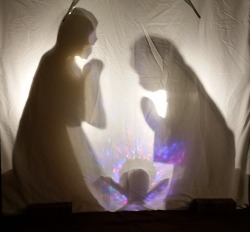The Greatest Christmas Song: The Missing Verse
When I think of O Come All Ye Faithful, I think especially of of verse 2. But when I looked up the verse online in the Cyber Hymnal, the words were a little different from what I am familiar with.
So I started pulling out hymnbooks from my shelf (yes, I have a collection of hymnbooks. Deal with it.). And surprisingly, I only found one hymnal that even had this verse! And it had the wording I knew. So, I’ll go with that (the meaning is the same in both versions I saw, so don’t get too hung up on the details).
Light of Light,
Lo! He abhors not the Virgin’s womb;
Very God
Begotten, not created
O come, let us adore Him
Christ the Lord!
Yes, certainly a verse we’ll need to take line-by-line!
 But first, a summary. This verse is basically taken from the Nicene Creed. The Nicene Creed was based on the Council of Nicea, a church council which discussed the nature of Christ and His relationship to God.
But first, a summary. This verse is basically taken from the Nicene Creed. The Nicene Creed was based on the Council of Nicea, a church council which discussed the nature of Christ and His relationship to God.
Why did a council need to be called? The two famous protagonists were Athanasius and Arius. Athanasius, the little Egyptian, was called the “Black Dwarf” by his enemies. He taught that the Son of God was eternal – uncreated. (The story of Athanasius is incredible – you might want to check out this book for the whole family.)
On the other side was tall, charming, Arius. He was from what is today Libya, but was now in Egypt as well. His tagline was,“There was a time when the Son of God was not”. In other words, the Son was created. (Jehovah’s Witnesses are one example of the modern heirs of Arius’ teaching.)
If the Son was “begotten” (argued Arius), then he must have had a beginning.
The council by no means “decided” the matter – the controversy continued long after. But various versions of the Nicene Creed have endured.
If you read what Athanasius himself wrote, you’ll see something a lot of people don’t understand. The argument wasn’t about what was most “expedient” for the church, or what the church leaders (or others) “preferred”. The question was, what does the Scripture say?
God of God / Very God: That is to say, the Son really is God. That much is clear from Scripture, constantly affirmed in different ways. The Son is Yahweh, the Creator (Hebrews 1). He already existed when the world began, as God (John 1:1). He is the Mighty God at His birth (Isaiah 9:6). (Here’s more – part 1, part 2)
Light of Light: Also from the Nicene Creed. Jesus said,”I came from the Father and have come into the world” (John 16:28). John confirmed this – “And the Word became flesh and dwelt among us, and we have seen his glory, glory as of the only Son from the Father, full of grace and truth” (John 1:14).
So the Son (Light) came from the Father (Light). But the Son isn’t something different – He’s not a lesser god, or 50% of God. He is God.
So the first part focuses on the simple who-is-He of the Son – He is God. The second part point us to God’s glorious nature. The Son is the glorious, majestic, sovereign, eternal, Creator God. God is shown to us by the Son. God’s light shines on us in the Son.
Lo! – an exclamation of surprise – Look!
He abhors not the Virgin’s womb: (or, He shuns not the Virgin’s womb) The eternal Spirit, the Mighty God, the Creator of time and space – you mean to say He became a fetus in the womb of a poor Middle Eastern woman? Nothing against the Middle East, or women, but He became a vulnerable tiny baby?
The contrast between the first part of the stanza to the second – in only a few words – is astounding. It would be hard to encapsulate it any better for Twitter.
(As far as I can tell, the original Latin here doesn’t use the word “abhors”, it simply says that this God of God Light of Light is now in the womb of the Virgin).
Begotten, not created: How is it that the Son is begotten, not created?
After a long post, I’m not going to get into all the details here. In English, “begotten” is used to translate various words in Greek, each with its own context. So, in my opinion, it doesn’t always refer to the same thing.
But what I do agree with is that Jesus was in some sense (actually, in more than one sense) “begotten”, but He was never created, because He’s eternally God. In other words, “begotten” never means that He started to exist. The Scripture teaches that the Son has always been.
So in summary – we are coming to the Word to hear about this birth. He was born already the King of Angels. But here’s the truly mind-blowing part – God Himself became man – He became a small, vulnerable human baby. You don’t need to know anything else to be amazed.

3 December 2018 @ 11:55 pm
The fact that the Lord of glory became a vulnerable human baby Boy never ceases to amaze me!! Nor should it!
What humility!
The Greatest Christmas Song: Index/Resources – Finding direction
14 November 2020 @ 7:11 pm
[…] The Greatest Christmas Song: The Missing Verse When I think of O Come All Ye Faithful, I think especially of of verse 2 … I started pulling out hymnbooks from my shelf. And surprisingly, I only found one hymnal that even had this verse! […]